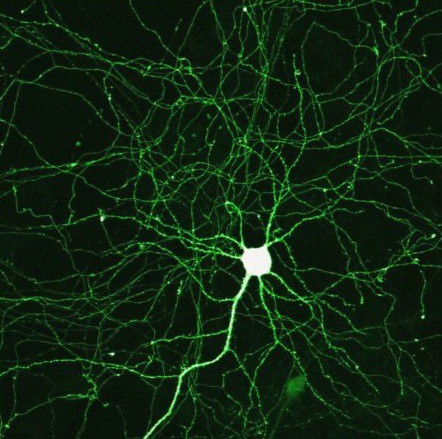

|
Taking charge As our animal selves, we have a brain in service of our desires and our instincts. As transcendent beings, we engage the mind in the service of transforming ourselves, re-molding the desires and the instincts, ultimately directing evolution of the mind itself. — Josh Mitteldorf |
1 May 2011
|
||
|
Division of labor There’s an evolutionary division of labor between children and adults. Children are the R&D department of the human species—the blue-sky guys, the brainstormers. Adults are production and marketing. They make the discoveries; we implement them. They think up a million new ideas, mostly useless, and we pick the three or four good ones and make them real. |
2 May 2011
|
||
|
Hearts beating in unison A group of Finish psychologists report that heart rates synchronize
during a religious ritual in Spain. Heart rates rose and fell
together for people who walk on hot coals and their relatives in the
audience who watched them. Synchronization of biorhythms has been reported in other contexts as well, but it is not clear why this would happen, or how two separate metabolisms communicate. I have had success with the following experiment: place a finger on a friend’s pulse as he places a finger on yours. Each of you vocalize or tap the other each time you feel a heartbeat. If your two heart rates are not too dissimilar, you may find your heart rates fall into synchrony. How does this work? At the very least, it indicates that we have much finer control over our autonomic nervous system than we generally acknowledge. Beyond this, heart synchrony may be classed with other evidence that biological systems have channels of communication that physics has yet to identify. |
3 May 2011
|
||
|
No judge The world is not a courtroom,
This is a caravan, ~ Saadi (Persian, 1184 - 1291) |
4 May 2011
|
||
|
Of butterflies and bees Listen to Evgeny Petrov play these two virtuoso encores (each under 2
minutes long), |
5 May 2011
|
||
|
Evolution in the real world ‘In trying to analyze the natural world, scientists are seldom aware of the degree to which their ideas are influenced both by their way of perceiving the everyday world and by the constraints that our cognitive development puts on our formulations. At every moment of perception of the world around us, we isolate objects as discrete entities with clear boundaries while we relegate the rest to a background in which the objects exist...’ We think of evolution as a long-sustained plan of the animal adapting to its environment. But in reality, all the while the environment is evolving in response to the presence of the animal. ‘One of the complications is that the effective environment is defined by the life activities of the organism itself. “Fish gotta swim and birds gotta fly,” as we are reminded by yet another popular lyric. Thus, as organisms evolve, their environments necessarily evolve with them. Although classic Darwinism is framed by referring to organisms adapting to environments, the actual process of evolution involves the creation of new “ecological niches” as new life forms come into existence. Part of the ecological niche of an earthworm is the tunnel excavated by the worm and part of the ecological niche of a tree is the assemblage of fungi associated with the tree’s root system that provide it with nutrients.’ |
6 May 2011
|
||
|
Thinking about thought “Reason is, and ought only to be the slave of the passions, and can never pretend to any other office than to serve and obey them.” — David Hume, born 300 years old today, was a child of the Enlightenment who early foresaw the limits of reason. The way Hume saw it, our brief lives, crowned by
unavoidable death, are unlikely to put us in touch with any grand
absolutes. On the other hand, the human mind is an indubitably powerful
tool and its powers of reasoning have penetrated many an enigma. Hume
was as amazed by human knowledge as the next guy. He simply wanted us to
be honest about its failings and limitations. Most of the things we know
come from observing what happens around us and making the reasonable
inference that what happens one day will continue to happen the next.
The sun will rise, dropped objects will fall, harsh words will bite,
etc. We don’t know the greater ‘why’ of such things, suggested Hume, and
there is no reason to think we ever will. “What a peculiar privilege has this little agitation of the brain which we call ‘thought’.” |
7 May 2011
|
||
|
More and more, my aim is to feel good about the way I feel, whether I feel good or not. — Josh Mitteldorf |
8 May 2011
|
||
|
Our Character only truly begins to mature at the moment when we fully
accept the Sense of Mystery, and release our Life into its Grace; only
when we finally accept the Truth of ‘Not-Knowing’ as the Essential
Nature of Being, rather than as a condition that is in need of ‘cure’,
is our Experience made Consummate. Only then do we Cease to interfere
with the Intrinsic Perfection of Ourselves. I’m enough of a scientist to believe that it is
essential to our nature to do battle with ignorance, fiercely engaging
the full power of our brains even as we know there will always
be limits, always new mysteries. |
9 May 2011
|
||
|
What to study The greatest scientific question of our age is whether biology incorporates physics that is yet undiscovered. Evidence for this might include telepathy and clairvoyance, animal navigation, and (my favorite) the link between cell phones and cancer. Physicists know that there are fundamental laws of physics yet to be discovered. Our understanding of gravity is not consistent with our understanding of quantum mechanics. The Big Bang theory can only be made to work if our world is imbued with stuff that has never been detected in any physics experiment, and there’s 20 times as much of it as there is of ‘ordinary matter’. It is good scientific practice to look first for explanations of any biological phenomenon within known physics. It is bad scientific practice to deny categorically that new physics could be involved. Quantum entanglement is an in-between case: it is not fundamentally new physics, but it is unknown in macroscopic systems at room temperature. Physicists know just how powerful a quantum computer will be, when we learn how to make them. Could it be that evolution scooped us by a billion years? |
10 May 2011
|
||
|
Benediction “May you find grace in the face of adversity; — Dr Suzanne Zoglio |
11 May 2011
|
||
|
Those who wish to embody the Tao should embrace all things.
To embrace all things means first that one holds no anger or resistance
toward any idea or thing, living or dead, formed or formless. Acceptance
is the very essence of the Tao. To embrace all things means also that
one rids oneself of any concept of separation; male and female, self and
other, life and death. Division is contrary to the nature of the Tao.
Foregoing antagonism and separation, one enters in the harmonious
oneness of all things. — Lao Tzu, fr the Hua Hu Jing, tr Brian Walker |
12 May 2011
|
||
|
To have a goal To have a goal, an aim, an end Seek neither joy nor happiness — Enid Kassner |
13 May 2011
|
||
|
To Twilight Linger, we pray,
O soundless feet,
Sing to thyself
We shall not hear;
So hast thou come, |
14 May 2011
|
||
|
Koan I’ve discovered that I’m constantly moralizing and telling myself what to do. I’ve committed to breaking this reprehensible habit. — Josh Mitteldorf If I work really hard at it, maybe I’ll be OK. |
15 May 2011
|
||
|
For a New Beginning
In out-of-the-way places of the heart,
For a long time it has watched your desire,
It watched you play with the seduction of safety
Then the delight, when your courage kindled,
Though your destination is not yet clear
Awaken your spirit to adventure; ~ John O’Donohue |
16 May 2011
|
||
|
As close as two humans can be We take it for granted that Siamese twins would separate if they
could choose...“You have a right to be alone, to be individuals alone,
in your own body alone, determining your own destiny, alone.” Isn’t this
the very definition of a free self, the knowledge that you can always
extract yourself from another? Yet, if you ask conjoined twins, most
seem quite comfortable with their shared bond. “We’d never agree to an
operation,” Dasha Krivoshlyapova told the BBC. “We just don’t need it.”
“Even when we were little we didn’t want one,” said Masha Krivoshlyapova.
“We are a little collective.” — Read
the rest of Stephany Anne Golberg’s article. |
17 May 2011
|
||
|
Beyond happiness In his 2008 book, “Gross National Happiness,” Dr. [Arthur] Brooks argues that what’s crucial to well-being is not how cheerful you feel, not how much money you make, but rather the meaning you find in life and your sense of “earned success” — the belief that you have created value in your life or others’ lives. “People find meaning in providing unconditional love for
children...Paradoxically, your happiness is raised by the very fact that
you are willing to have your happiness lowered through years of dirty
diapers, tantrums and backtalk. Willingness to accept unhappiness from
children is a source of happiness.” |
18 May 2011
|
||
|
People helping people WikiHow is an uncredentialed compendium of advice and experience. Despite infiltration by commercial interests, it contains a trove of diverse and useful suggestions. Nestled among practical articles about How to Make a Compost Pile, How to Write a Press Release and How to French Kiss is wisdom about How to Overcome Fear of Death. |
19 May 2011
|
||
|
What? Brahms, exuberant? I relish the moments when Brahms is unabashedly happy. |
20 May 2011
|
||
|
Greatest mistake in human history: agriculture Are twentieth century hunter-gatherers really worse off than farmers? Scattered throughout the world, several dozen groups of so-called primitive people, like the Kalahari bushmen, continue to support themselves that way. It turns out that these people have plenty of leisure time, sleep a good deal, and work less hard than their farming neighbors. For instance, the average time devoted each week to obtaining food is only 12 to 19 hours for one group of Bushmen, 14 hours or less for the Hadza nomads of Tanzania. One Bushman, when asked why he hadn’t emulated neighboring tribes by adopting agriculture, replied, ‘Why should we, when there are so many mongongo nuts in the world?’ And time devoted to clothing and shelter is negligible. In comparison, the average American works 30 hours a week just to cover basic needs, and that doesn’t include commuting time. While farmers concentrate on high-carbohydrate crops like rice and potatoes, the mix of wild plants and animals in the diets of surviving hunter-gatherers provides more protein and a better balance of other nutrients... It's almost inconceivable that Bushmen, who eat 75 or so wild plants, could die of starvation the way hundreds of thousands of Irish farmers and their families did during the potato famine of the 1840s. — Jared Diamond
|
21 May 2011
|
||
|
Peace in the heart, peace in the world The pursuit of inner peace is not separable from the cause of peace as part of a worldwide political movement. We cannot live walled-off from the world’s violence. And the peace that we patiently nurture within ourselves can turn us into beacons, broadcasting ripples of peace through a larger sphere. We do not have to understand a conflict or judge who is in the right in order to know that violence is never an appropriate recourse. It is always appropriate to take our stand for peace and tolerance. — Josh Mitteldorf Today is the eighth annual Interfaith Walk for Peace. |
22 May 2011
|
||
|
The Third Precept Thich Nhat Hanh has given us 14 precepts. Structured as ‘Thou shalt nots’ like the Ten Commandments of old, they are rules to live by. They offer us a lofty standard, perhaps impossible for mere mortals. I plan to feature them in this space one by one over the coming weeks. The Ten Commands begin with a self-important ‘Thou shalt have no other gods before me.’ Thich offers us exactly the opposite, warning us not to take him or his words too seriously, or to hold fast to any doctrine whatever, as if it were absolute truth. (I featured Precepts 1 and 2 back in 2006.) The third precept begins with a statement to which we might easily subscribe: Do not force others, including children, by any means whatsoever, to adopt your views, whether by authority, threat... Yes, we can forswear coercion. Or if we cannot in practice, at least we can agree it is a worthy goal. But Thich continues: whether by authority, threat, money, propaganda, or even education. However, through compassionate dialogue, help others renounce fanaticism and narrow-mindedness. ‘Even education.’ That drives the meaning, home, doesn’t it? Every piece of advocacy, for whatever cause – no matter how worthy – is, at best, an opportunistic expedient, a shortcut. Every human culture is a set of viewpoints carrying the force of social pressure. ‘This is what you are to believe if you wish to socialize in the Agora and participate in the general discourse.’ Thich is telling us that in the short run we may move toward more openness and tolerance by instilling values of openness and tolerance. But ultimately, all such ‘instilling’ is self-defeating, because it perpetuates group-think and supports a system which is, ultimately, coercive. And so we are enjoined from advocating for peace or justice or democracy or Buddhism. In every social interaction, we are only there to help open another’s mind, to facilitate the flowering of fully independent thought. But is it even possible to live free of culture? How about the skills of language and arithmetic and music and art? Is it possible even to teach a child to speak without subtly imbuing cultural values? |
23 May 2011
|
||
|
24 May 2011
|
||
|
Living outside of time Researchers, led by Professor Chris Sinha from the University of Portsmouth Department of Psychology, studied the way in which time was talked about and thought about by the Amondawa people of Brazil. Their research is published in the journal Language and Cognition. Professor Sinha said: “For the Amondawa, time does not exist in the same way as it does for us. We can now say without doubt that there is at least one language and culture which does not have a concept of time as something that can be measured, counted, or talked about in the abstract. This doesn’t mean that the Amondawa are ‘people outside time’, but they live in a world of events, rather than seeing events as being embedded in time.” Team members including linguist Wany Sampaio and anthropologist Vera da Silva Sinha, spent eight weeks with the Amondawa researching how their language conveys concepts like ‘next week’ or ‘last year’. There were no words for such concepts, only divisions of day and night and rainy and dry seasons. They also found nobody in the community has an age. Instead, they change their names to reflect their life stage and position within their society, so that for example a little child will give up their name to a newborn sibling, and take on a new one. Professor Sinha said: “We have so many metaphors for time and its
passing – we think of time as a ‘thing’ – we say ‘the weekend is nearly
gone’; ‘she’s coming up to her exams’; ‘I haven’t got the time’, and so
on, and we think such statements are objective, but they aren’t. We’ve
created these metaphors and they have become the way we think. The Amondawa don’t talk like this and don’t think like this, unless they
learn another language. — Read more from University of Portsmouth |
25 May 2011
|
||
|
William Bolcom’s Ghosts Humor is one of the best talents of composer William Bolcom, born this day in 1938. Here are a few YouTube selections: Poltergeist
|
26 May 2011
|
||
|
Breakthroughs fast and furious Human skin cells can be converted directly into functional neurons in a period of four to five weeks with the addition of just four proteins, according to a study by researchers at the Stanford University School of Medicine. The finding is significant because it bypasses the need to first create induced pluripotent stem cells, and may make it much easier to generate patient- or disease-specific neurons for study in a laboratory dish. For people suffering from stroke damage to the brain, or spinal injury, growing new neurons has been a goal for decades. Skin cells are easy to come by - we shed them every day. The direct conversion of skin cells to neurons contrasts with similar research that first transforms skin cells to a pluripotent, or developmentally flexible, state and then coaxes them to become neurons or other specialized cells. A separate team of Stanford researchers recently used this technique to generate patient-specific neurons from a woman with Parkinson’s disease. However, that process is labor-intensive and relies on cell lines that may not fully reflect the cell-to-cell diversity that occurs in a natural population. [Principal investigator Marius] Wernig emphasized that it is important to continue to explore both research techniques. |
27 May 2011
|
||
|
Deep down within the heart there is a stillness which is healing, a trust in the universal laws which is unwavering, and a strength which is rock-like. But because it is so deep we need both patience and perseverance when digging for it. — Paul Brunton ‘He is beginning to master wisdom when he tries to learn how not to try.’ |
28 May 2011
|
||
|
As a teacher, I’ve been learning We like to pretend that the instruction we offer our children is for their edification, when it is largely for our convenience. The things they do that annoy us most are occasions not for their correction, but for our self-examination. — Josh Mitteldorf |
29 May 2011
|
||
|
War hero turned anti-war hero Major General Smedley Butler was a World War I hero, the most highly decorated Marine in the history of the US Service. He came home to explain to America that the war had been an unredeemed tragedy, a scam perpetrated upon them. He continued bravely to educate the public on the myth and the reality of war, and left us a book mincing no words, War is a Racket. WAR is a racket. It always has been. It is possibly the oldest, easily the most profitable, surely the most vicious. It is the only one international in scope. It is the only one in which the profits are reckoned in dollars and the losses in lives. Here is a speech he delivered to VFW in 1933. |
30 May 2011
|
||
|
Sometimes democracy works On Saturday, 200,000 Germans protested against nuclear power, 100,000 in Berlin alone. This was the largest of a wave of public demonstrations that have gone on all spring, since the Fukushima disaster. On Monday, the Chancellor reversed her stance and announced that Germany would be phasing out its existing nuclear power plants, and canceling all new ones. |
31 May 2011
|



























